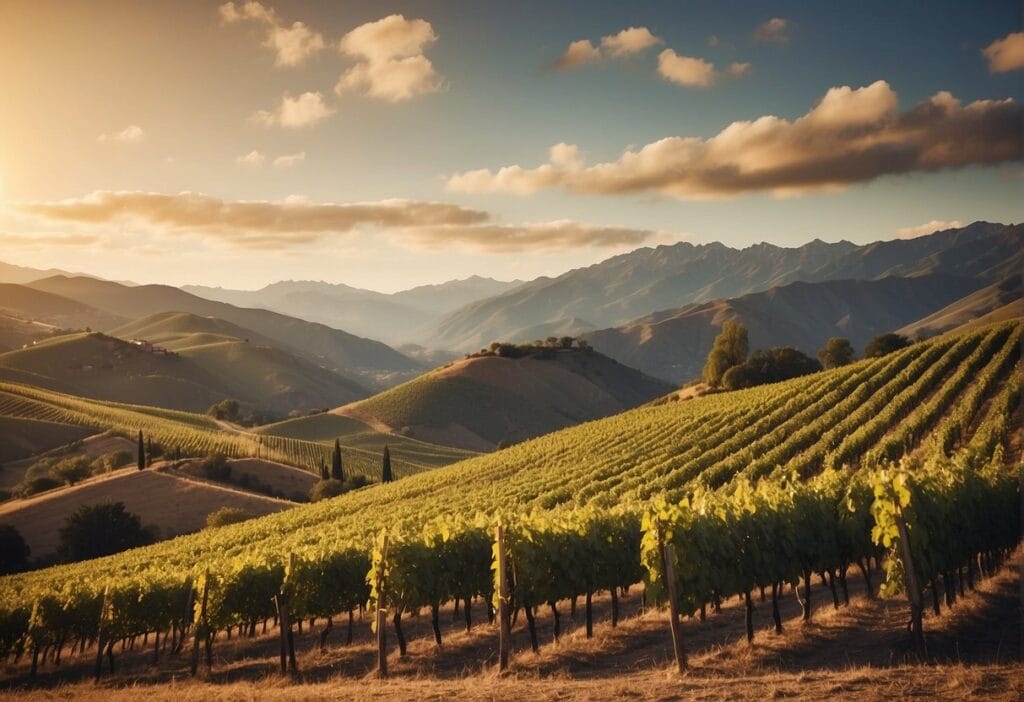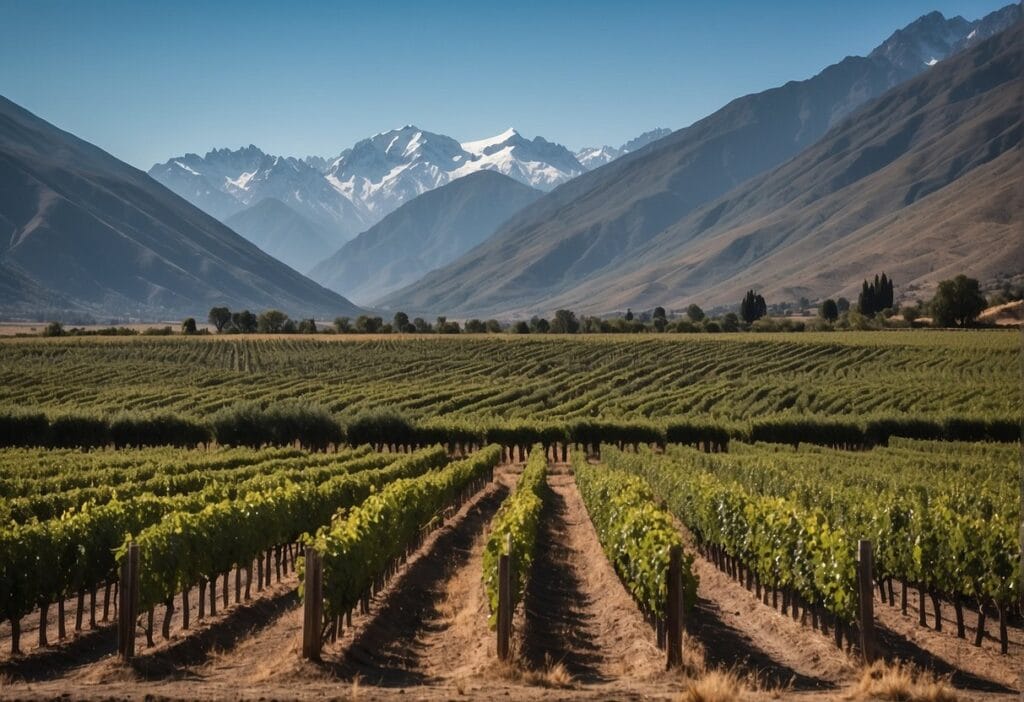South Africa’s wine regions represent a vibrant chapter in the country’s rich cultural tapestry.
With a winemaking history stretching back over 350 years, South African wine has emerged from the shadows of its past to claim its place on the global stage.
Sheltered by breathtaking landscapes, the vineyards of South Africa benefit from the diverse geography and climate that endow each wine region with a unique character and flavor profile.
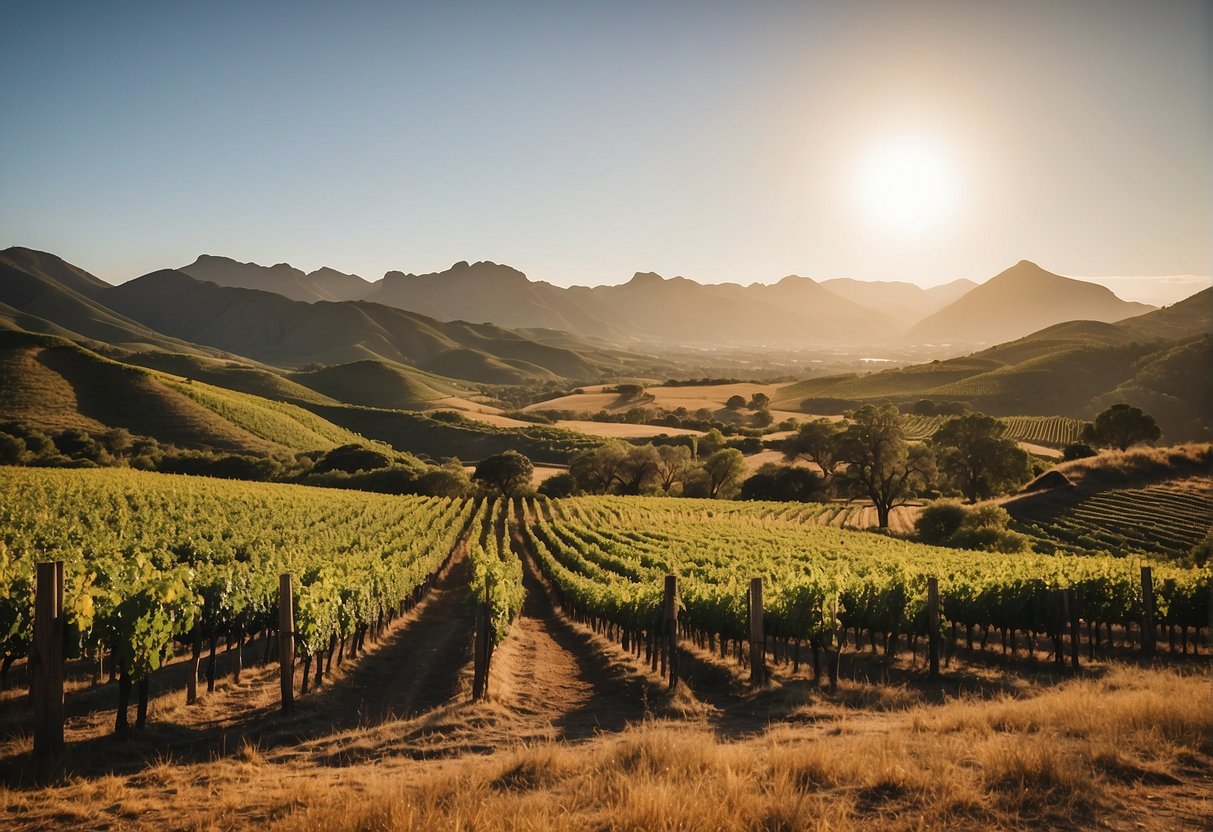
As you explore South Africa’s winelands, you’ll find notable districts like Stellenbosch and Franschhoek, which are synonymous with high-quality wines and are steeped in history and tradition.
The wine industry in South Africa isn’t just about producing extraordinary wines; it’s also about creating a wine culture that reflects the spirit of its people.
From the robust reds of Paarl to the elegant whites of Elgin and the pioneering wineries of Swartland, each area contributes to a rich mosaic of styles and varieties that continue to evolve and impress wine aficionados around the world.
Key Takeaways
- South Africa is known for diverse wine regions that contribute a rich array of wine styles and flavors.
- The country’s winemaking history and culture are deeply rooted, offering a unique experience that sets apart each vineyard and wine district.
- Embracing both tradition and innovation, the South African wine industry continues to grow, reflecting the dynamic future of viticulture in the region.
History of South African Wines
South African wines boast a rich heritage that intertwines with the country’s complex history.
You’ll discover the influence of colonial powers, the impact of political systems, and the resilience in the face of agricultural challenges.
Dutch East India Company
In the 17th century, the Dutch East India Company established a refreshment station at the Cape of Good Hope.
The arrival of Jan van Riebeeck in 1659 marked the beginning of viticulture in South Africa, with the first bottle reportedly produced by van Riebeeck himself.
Impact of Apartheid
During the apartheid era, South African wines experienced a severe hit, with international boycotts causing a significant decline in exports.
However, post-apartheid, the industry saw a renaissance, with the early 1990s bringing newfound growth and access to global markets.
Phylloxera Crisis
The phylloxera crisis in the late 1800s ravaged South African vineyards, as it did to many others around the world.
The devastation prompted the importation of phylloxera-resistant rootstocks, leading to a slow but vital recovery.
Rise of New World Winemaking
South Africa has made impressive strides as a New World wine producer, particularly after the phylloxera crisis.
Indigenous varieties such as Pinotage and regions like Stellenbosch have gained international acclaim, reflecting the dynamic and innovative spirit of South African winemaking.
Geography and Climate
South Africa’s wine regions offer a dynamic range of geographical landscapes and climate conditions, providing a diverse terroir for its vineyards.
You’ll find a striking contrast between coastal influences and the sheltering effect of mountains and valleys, all under the overarching presence of a prevailing Mediterranean climate.
Coastal Influence and Terroir
The Western Cape’s coastal regions benefit from the cooling Atlantic sea breezes, which contribute to a slower grape maturing process, enhancing the flavor complexity in the wines.
This interaction between the ocean’s proximity and the land imparts a distinctive terroir, particularly favoring varieties like Cabernet Sauvignon, Syrah, and the uniquely South African Pinotage.
Mountains and Valleys
The majestic mountains and sweeping valleys are not just scenic backdrops but also play a crucial role in the viticulture of South Africa.
To your advantage, the elevation changes and diverse soil conditions in these areas create microclimates that allow a variety of grape types to thrive.
The valleys near Paarl and Stellenbosch, set amongst mountains, are renowned for producing some of the country’s most celebrated wines.
Mediterranean Climate Versus Others
While many of South Africa’s wine regions enjoy a Mediterranean climate—characterized by wet winters, hot dry summers, and a significant number of sunshine hours—other areas exhibit variations.
You’ll encounter more savoury wines from the cooler Mediterranean climate of regions like Stellenbosch, while the hotter, drier areas such as Robertson and Swartland are known for richer, more intensely flavored wines.
In these varied climates, the winemakers’ understanding of the local conditions is key to cultivating wines that express the essence of their environment.
Wine Regions Overview
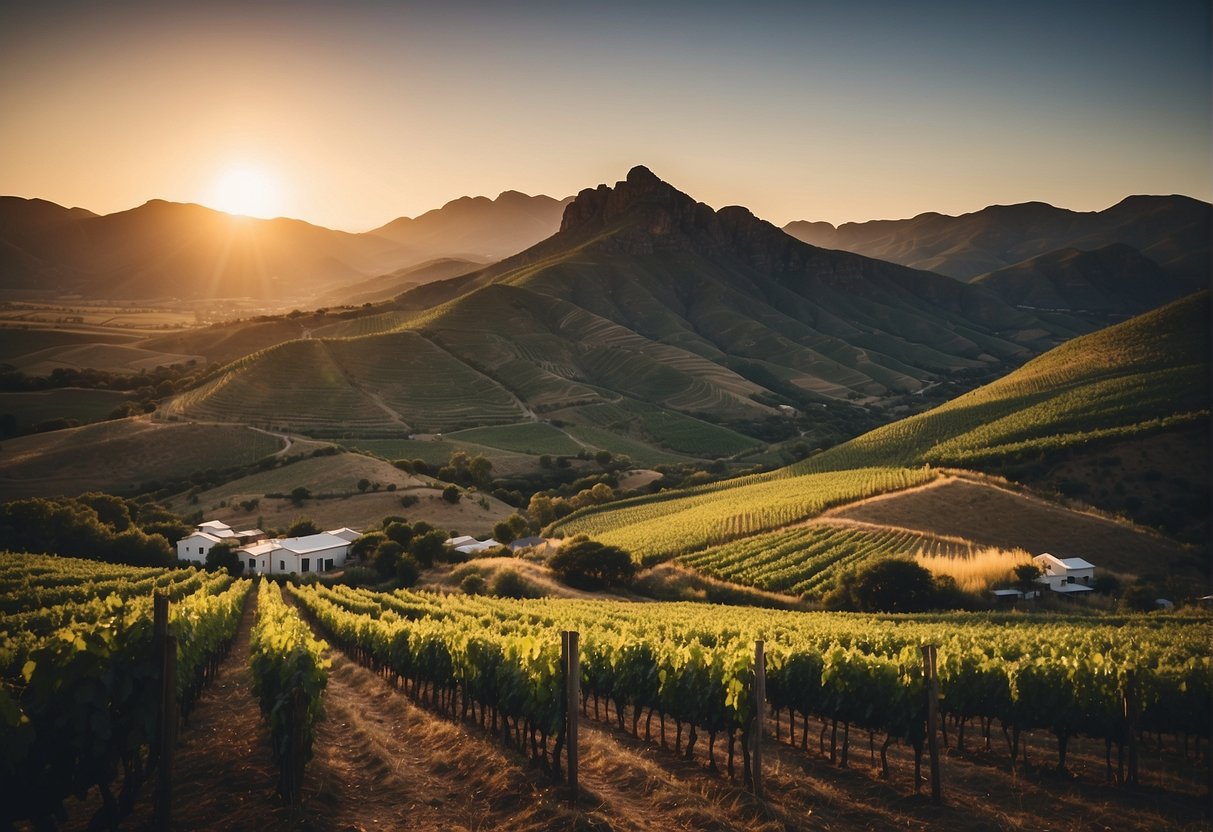
South Africa’s wine regions offer you a diverse palette of climates and soils, leading to unique wine experiences.
From the bustling winelands surrounding Cape Town to the expansive vineyards along the Orange River, each area has its distinct charm and variety of wines to explore.
Cape Town and Surrounds
In the area surrounding Cape Town, you’ll discover some of the most picturesque and renowned wine regions.
The Western Cape houses famous appellations such as Stellenbosch and Paarl, which are celebrated for their robust reds and crisp whites.
These areas benefit from the cooling breezes of the nearby ocean and a range of altitudes and soils, making for an extensive variety of wines.
- Stellenbosch: Known for premium red wines like Cabernet Sauvignon and Merlot.
- Paarl: Offers a range of white and red wines, including the popular Chenin Blanc.
Northern Cape and Orange River
The Northern Cape and the Orange River provide a stark contrast to the Western Cape with their unique arid conditions and fertile banks.
This vast region is less well-known but plays an important role in bulk wine production. The warm climate here is suited for cultivating grape varieties such as Chenin Blanc and Colombard.
- Orange River: A key contributor to the region’s volume, providing luscious, sweet wines.
The Diverse Wards of the Western Cape
Within the Western Cape, a multitude of wards grant wine enthusiasts a mosaic of microclimates and soil types.
Each ward specializes in certain grape varieties, producing wines with a strong sense of place. Areas like Swartland and Walker Bay have gained international acclaim for both their innovative spirit and adherence to tradition.
- Swartland: Known for its full-bodied Syrah and old-vine Chenin Blanc.
- Walker Bay: Celebrated for cooler climate varieties such as Pinot Noir and Chardonnay.
Notable Wine Districts
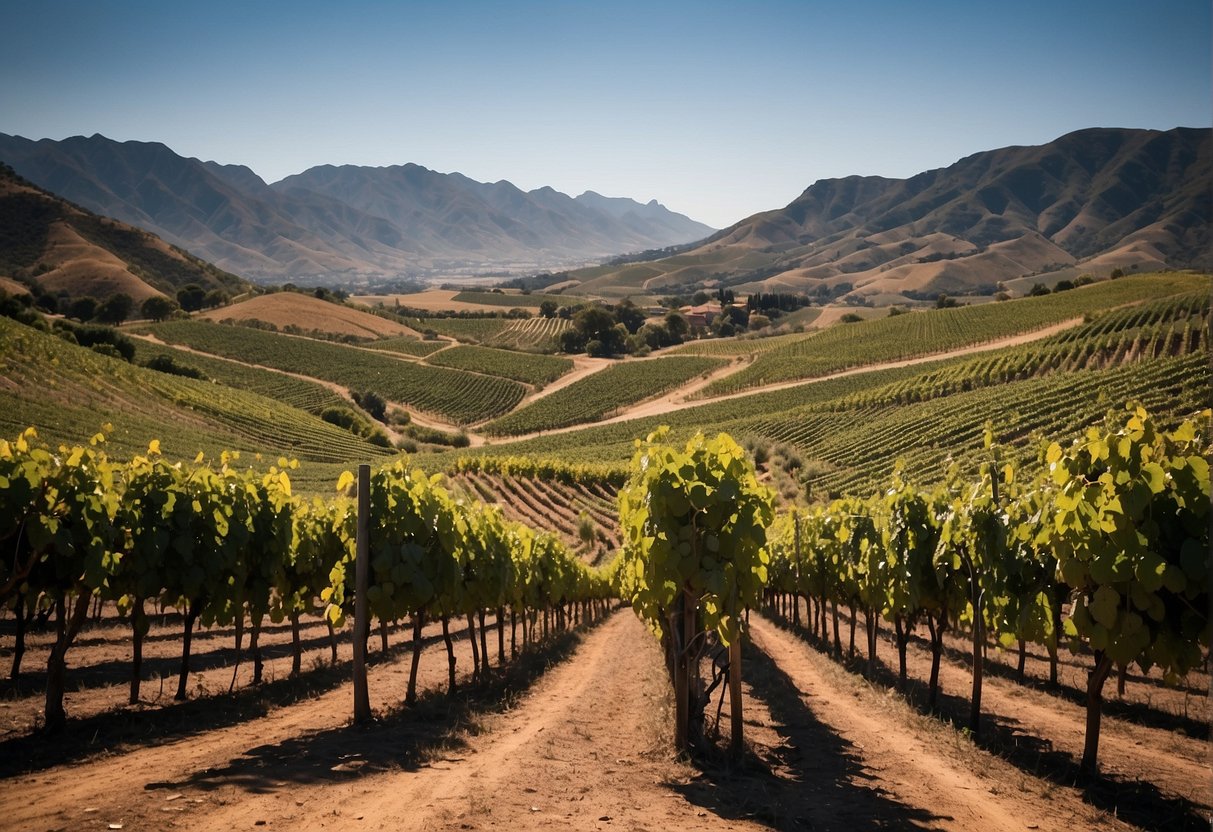
In South Africa, your journey through the world of wines isn’t complete without exploring its notable wine districts. Let’s take a look at some key regions where the magic happens.
Stellenbosch: Often hailed as the wine capital, Stellenbosch is renowned for its quality red and white varietals.
Here, you can visit an array of wineries set against the stunning backdrop of the Cape Fold mountains. The district’s robust Cabernet Sauvignon is a must-try for red wine aficionados.
- Franschhoek: A valley rich with French Huguenot heritage, Franschhoek couples breathtaking scenery with world-class wines.
- Notably, this is a region to savor exquisite Méthode Cap Classique and Chardonnay. You’ll feel the friendly embrace of its boutique wineries and the elegance in every glass.
Paarl: With a warmer climate, Paarl is your go-to for rich, full-bodied wines.
This district’s Shiraz boasts a distinct, spicy profile, and their Chenin Blanc showcases the diversity of South African whites.
Walker Bay and Elgin: Venturing into the cooler climates of Walker Bay and Elgin, you’re treated to outstanding Pinot Noir and Chardonnay.
These districts showcase their finesse in producing wines with exquisite acidity and complexity.
- Swartland: If you seek intensely flavored wines, the dry areas of Swartland offer robust reds that reflect the rugged landscape.
- Expect to taste assertive yet well-balanced Rhône blends.
Robertson and Olifants River: For those with a sweet tooth, the Robertson district is a haven for dessert wines, while Olifants River is home to generous, fruity whites.
They serve as a testament to the range found within South African wines.
Stellenbosch

When you explore the world of South African wines, Stellenbosch is a name you’ll often encounter as a premier wine-producing region. Nestled about 34 miles east of Cape Town, this area is renowned for its vibrant wine community and has a rich wine-producing history, earning it a reputation as the most famous wine region in South Africa.
Wine Varieties in Stellenbosch:
- Red Wines: Primarily known for Cabernet Sauvignon, Merlot, and Syrah (also known as Shiraz).
- White Wines: Includes Chardonnay and Sauvignon Blanc, which flourish in this climate.
The region’s geography, climate, and soil diversity contribute significantly to the complexity and quality of its wines, creating a range that includes bold, blackberry-and-spices Syrah and rich-styled aromatic whites. Your palate might delight particularly in the Chenin Blanc and Viognier from this area. Stellenbosch has been likened to the Napa Valley for its comparable climate and the powerful presence it holds in the South African wine industry.
Key Points about Stellenbosch:
- Climate: Warm Mediterranean, perfect for a variety of grapes.
- Soil: Diverse, ranging from sandy to clay-rich, contributing to a multitude of wine styles.
- Wine Tours: Highly developed, offering immersive experiences in the winemaking process and tastings.
Discovering Stellenbosch wines means indulging in a spectrum that reflects both the heritage and innovation of South African viticulture. Each estate here offers a unique story and selection of wines, so your journey through the Stellenbosch wine region could be as rich and varied as the wines themselves. Whether you’re a seasoned connoisseur or a casual enthusiast, there’s a flavor and aroma waiting to captivate your senses.
Franschhoek
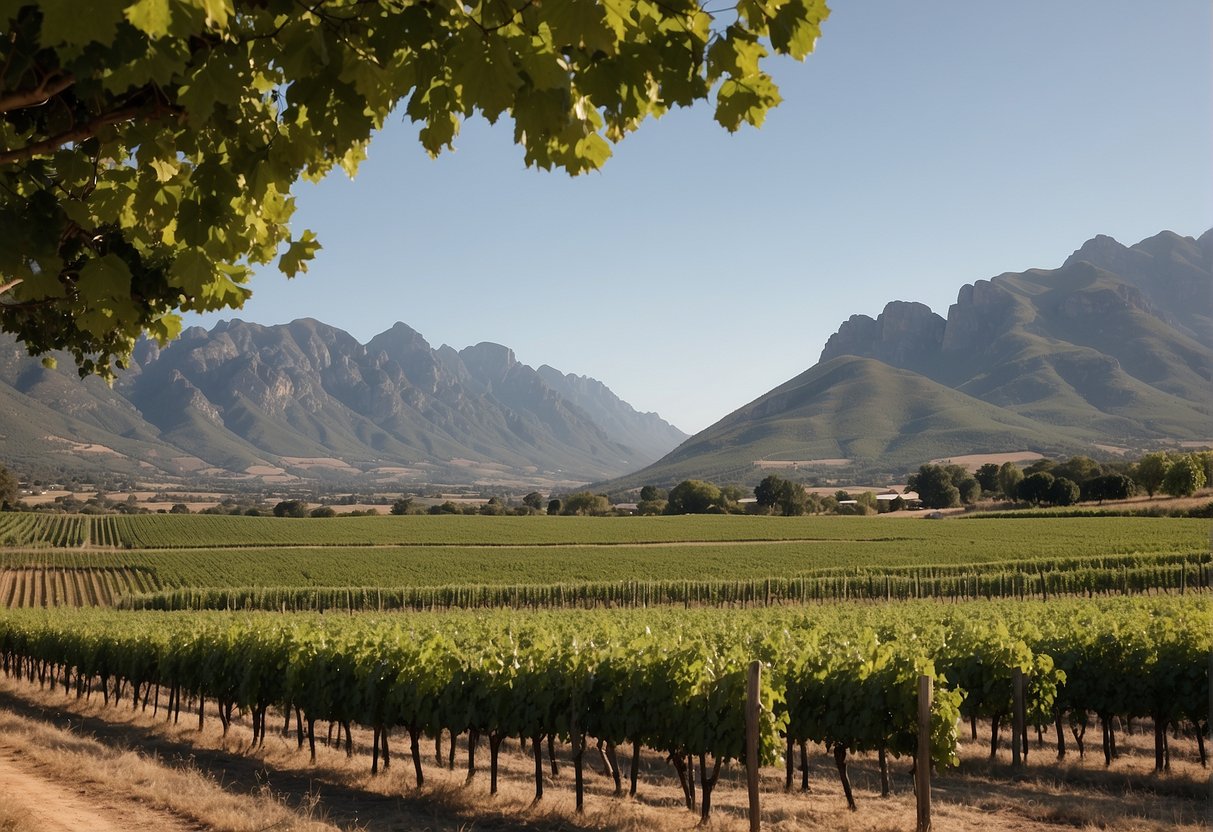
Nestled in South Africa’s Western Cape, Franschhoek is a picturesque wine region bursting with heritage. You’ll discover vineyard-lined valleys steeped in history dating back to the 17th Century. It’s an area renowned for its high-quality wines, embodying the essence of both classic and innovative winemaking techniques.
When you visit Franschhoek, you’re stepping into what many call the food and wine heartland of South Africa. The region offers a diverse range of wine estates, from heritage-rich farms like La Motte to innovative newcomers that shape the future of viticulture.
Popular Vineyards in Franschhoek:
- La Bri Wine Estate
- Môreson
- Boschendal Wine Estate
Mont Rochelle is one of the most popular accommodation options in the region, offering not only a tranquil retreat but also horse-riding and hiking opportunities for the more adventurous. You may want to explore wine farms that are child friendly, ensuring fun for the whole family.
Wine Tours and Tastings in Franschhoek are tailored to suit all palates, from novices to connoisseurs. With the option of regal, guided tastings and the availability of Ultimate Flexibility with free cancellation up to 24 hours before, you can plan your tour around the world-renowned Franschhoek vineyards without any stress. Each estate showcases unique varieties and blends that capture the rich terroir of the region.
Whether you’re dining at award-winning restaurants or savoring a glass of wine with panoramic views, your experience in Franschhoek will be both unforgettable and delightful.
Paarl
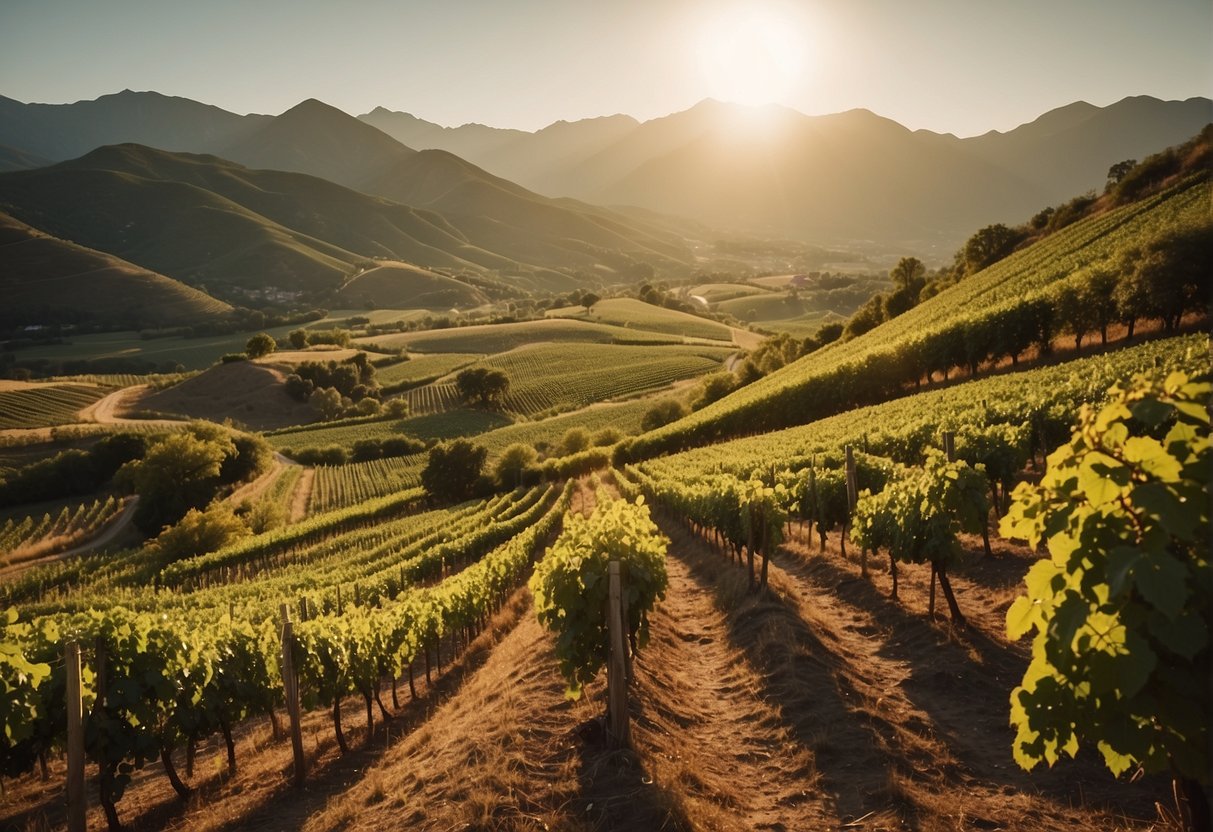
Nestled in the Western Cape of South Africa, Paarl is a renowned wine region that promises a delightful journey for your palate. You’re invited to explore an area steeped in winemaking history, dating back to the 17th century. With its Mediterranean climate, Paarl provides superb conditions for vineyards, producing wines with characteristics unique to the region.
Paarl’s location, 60 kilometers inland from Cape Town, gifts it with a slightly warmer temperament compared to its coastal neighbors. This warmth is ideal for cultivating robust red wine varieties, such as Shiraz, Cabernet Sauvignon, and Pinotage, South Africa’s signature grape.
| Wine Styles | Key Varietals |
|---|---|
| Robust Red Wines | Shiraz |
| Cabernet Sauvignon | |
| Pinotage |
As you embark on your wine adventures through Paarl, you will encounter a range of wineries with rich winemaking traditions. Pay a visit to the historic estates around the region for a taste of their legacy. For a curated experience, the wineries in Paarl boast exceptional wine-tasting opportunities, set against the backdrop of stunning mountainous landscapes.
The region’s warmer climate challenges winemakers to produce expressive and powerful wines, but they indeed rise to the occasion as illustrated by their internationally beloved wines. Paarl’s winemakers employ innovative techniques to manage the heat and ensure the production of fine wines that reflect their dedication to the craft.
Walker Bay
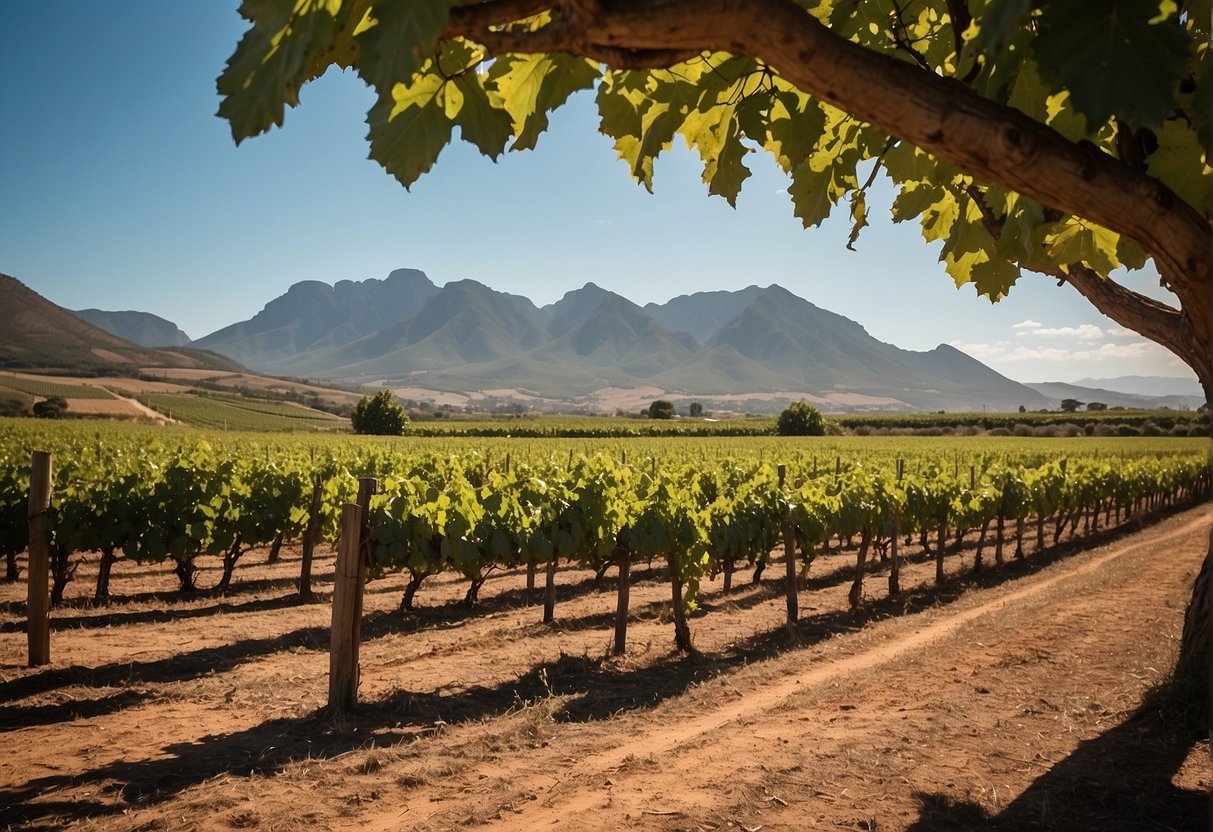
You’ll find Walker Bay on the south coast of the Western Cape, about 95 kilometers (60 miles) from Cape Town. This area boasts one of South Africa’s coolest maritime climates, which is crucial for grape cultivation. The ocean’s influence brings cool breezes and evening mists that are ideal for growing delicate varietals.
Climate & Soil
- Maritime climate: Moderate temperatures with a cooling ocean influence
- Soil types: Vary from clay to shale, providing excellent drainage for vines
Walker Bay is particularly known for its Pinot Noir and Chardonnay, which have been compared to Burgundian styles. These wines benefit from the longer ripening period afforded by the cool climate, giving them a balance of acidity and flavor that’s hard to find elsewhere in South Africa.
Noteworthy Facts
- Famed for: Pinot Noir and Chardonnay
- Geography: Stretches from Bot River to Sunday’s Glen
- Key area: Hemel-en-Aarde Valley
The region’s Hemel-en-Aarde Valley, translated as “Heaven and Earth,” is home to some of the most esteemed vineyards, with a reputation for high-quality wines. Whether you’re sampling a glass of Pinot Noir or Chardonnay, you’re experiencing the unique terroir of Walker Bay.
When exploring wines from this region, you’re likely to encounter names like Bouchard-Finlayson and Hamilton-Russell, which are synonymous with top-tier Walker Bay wines. Take a moment to appreciate the subtleties in your glass; the effects of the cool, seaside climate, and the passion of winemakers who elevate South African wines to new heights. Learn more about the Walker Bay wine region and its offerings from Wine-Searcher and Vivino.
Elgin
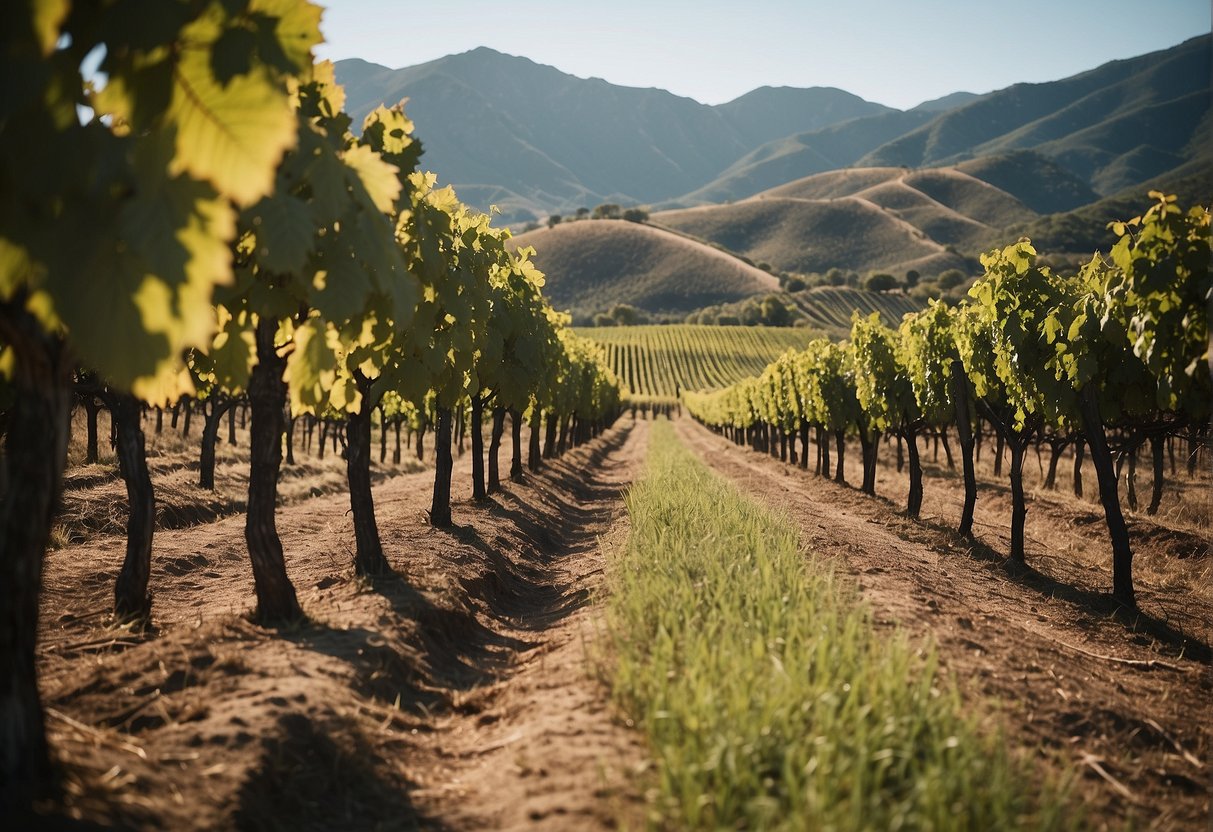
The Elgin Valley, nestled in the Overberg region near Cape Town, offers you a refreshing take on South African wines. This area has gained attention for its cool climate, perfect for producing wines with vibrant acidity and complex flavors.
Chardonnay, Pinot Noir, and Sauvignon Blanc are some of the standout varietals you’ll find here. These grapes benefit from a longer growing season, thanks to the cool temperatures, which brings out distinct nuances in their profiles.
- Chardonnay: Look for a balance of fruit and minerality, with a restrained use of oak.
- Pinot Noir: Delivers intricate layers of red fruits, earthiness, and sometimes a delicate floral hint.
- Sauvignon Blanc: Expect lively citrus and tropical notes with a zesty, crisp finish.
Your experience of Elgin wines might also include lesser-known but equally delightful Riesling or Syrah, displaying just how diverse this region’s offerings can be.
Historically, Elgin was renowned for its orchards, especially apples, but you’ll now find vineyards flourishing alongside, taking advantage of the fertile soils and cool climate. With a blend of traditional farming and modern winemaking techniques, this region has rapidly become a must-visit for any wine enthusiast.
| Visiting Elgin | Why It’s Special |
|---|---|
| Wine Tours | Cool-climate variety selection |
| Tastings | Unique terroir expression |
| Vineyards | Inviting, scenic landscapes |
Remember to pace yourself as you sample these refined South African wines. Each bottle tells a story of Elgin’s distinctive nature, a testament to the region’s evolution from fruit farming to prestigious winemaking.
Swartland
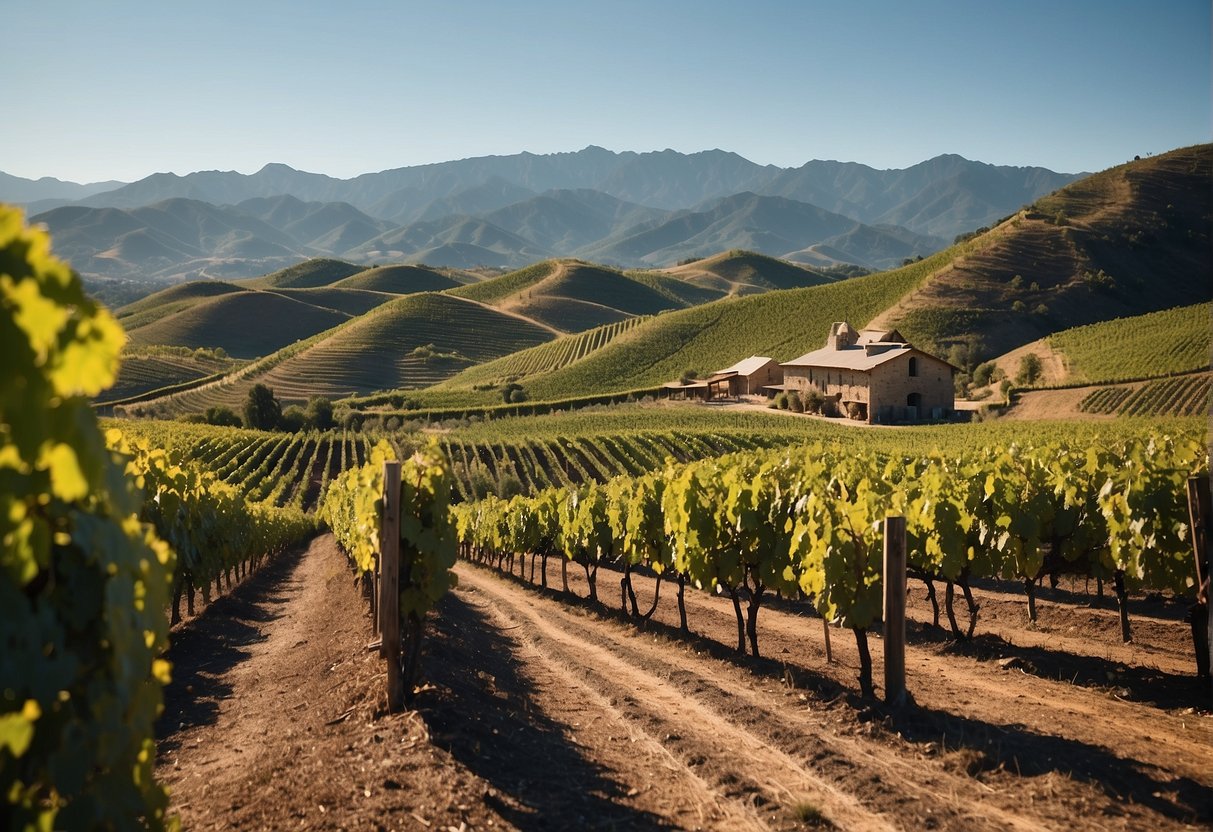
If you’re venturing into South African wines, Swartland is a region you can’t overlook.
Located 65 kilometers north of Cape Town, this area has transitioned from rugged wheat fields to dynamic vineyards, shaping a robust wine region.
Your interest in wines with distinctive character, like those found in Swartland, will be rewarded with deep, fruit-driven flavors.
Swartland is well-regarded for its old vine offerings, particularly in Shiraz, Chenin Blanc, Grenache, and Pinotage.
Imagine sipping wines that encapsulate the energy of an ambitious set of winemakers, described as pushing the envelope on viniculture. The vivacious spirit here has branded them as the “cowboys” of South African wine.
Here’s what you can expect from the varietals:
- Shiraz: An epitome of boldness with peppery notes.
- Chenin Blanc: Exhibits fresh and fruity profiles.
- Grenache: Lends a spicy and berry-laden taste.
- Pinotage: Offers a unique and robust flavor.
In Swartland, the land speaks through the wine, notably after the native rhinoceros bush adds a distinct hue to the terrain, bestowing the region with its name which translates to “black land”.
The region’s climate favors the use of bush-vines, contributing to the concentrated flavors found in its bottles.
Your palate will appreciate the rich tapestry of tastes in Swartland’s wines.
When exploring options beyond the mainstream, the wines of Swartland offer a fresh perspective, pairing remarkably with adventure and a curiosity for the less trodden vineyards of the world.
Robertson
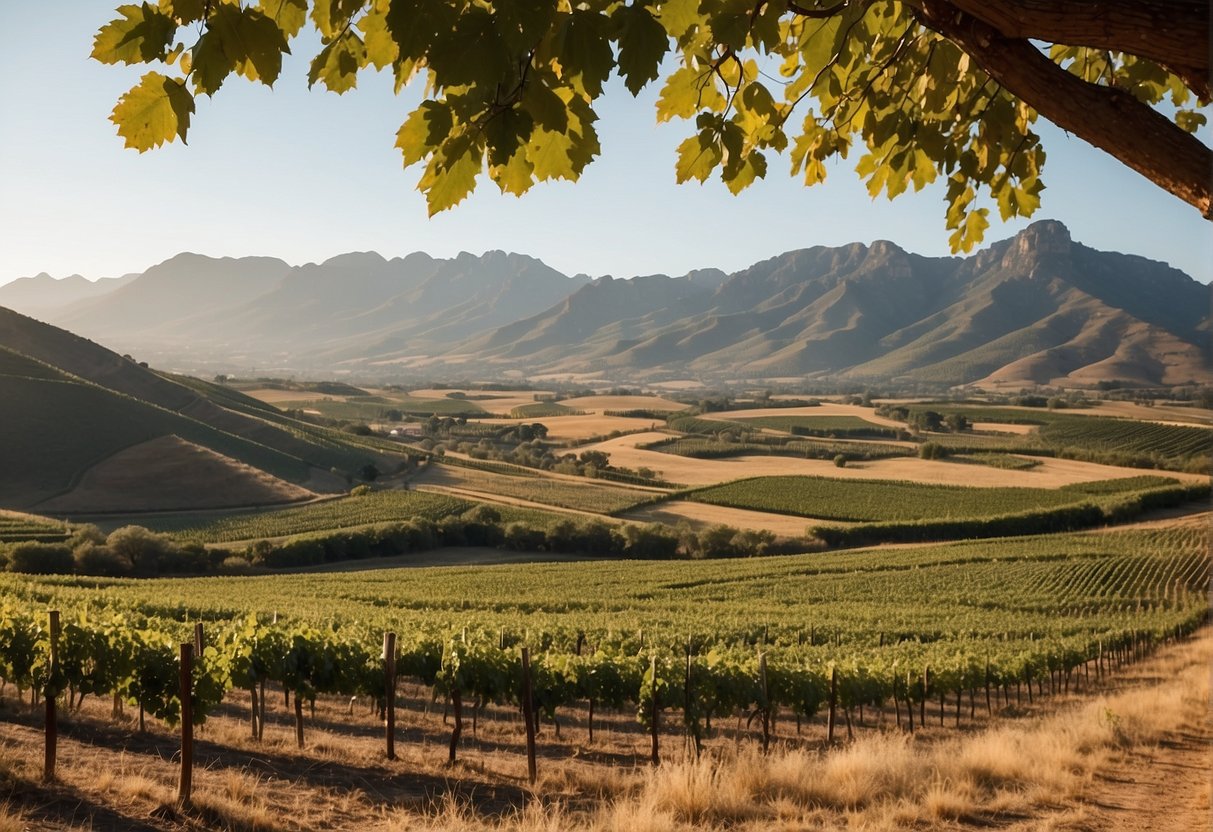
Nestled in the Western Cape of South Africa, your exploration of wine regions would not be complete without a visit to Robertson.
This area is renowned for its wine production, with a focus on Chardonnay and Shiraz grape varieties which thrive in this region.
Rich, fruit-driven flavors characterize the wines from this area.
You’ll find that the climate and soil in Robertson create ideal conditions for vineyards, giving the wines their distinctive taste and character.
| Main Varietals | Wine Characteristics |
|---|---|
| Chardonnay | Rich, with a fruit-driven palate |
| Shiraz | Full-bodied with spicy notes |
Robertson is part of the larger Breede River Valley and is marked by a landscape that’s as breathtaking as it is diverse.
The region isn’t just about high-quality wine production; it’s also about the experience of South African hospitality.
During your visit, consider touring some of the local estates, which offer insights into the winemaking process and, of course, the opportunity for tastings.
Wine aficionados appreciate the region for its sophistication and reach, and you’re likely to understand why as you sample its offerings.
For a comprehensive list of wineries to plan your visit, you can check out the top wineries in Robertson, including some of the oldest winemakers in the region. Each estate has a unique charm and selection of wines that reflect the essence of Robertson.
Olifants River
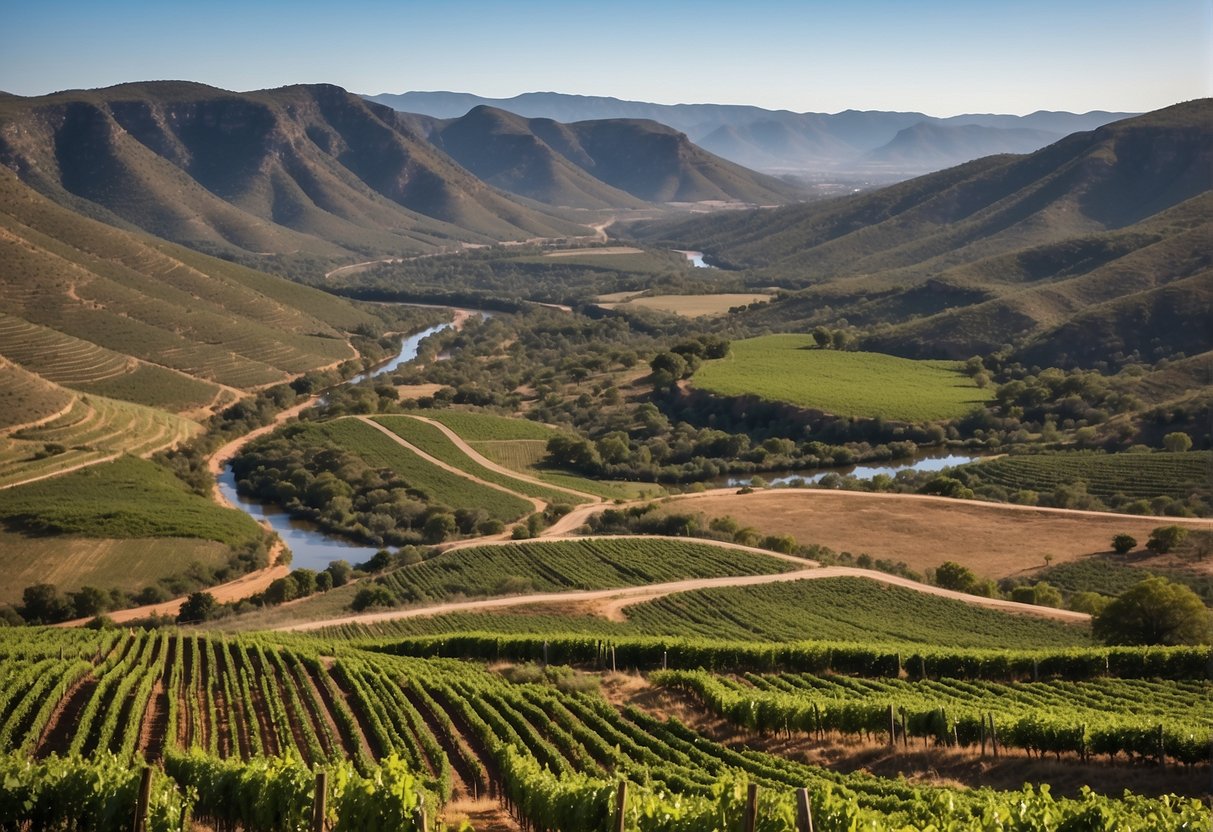
Nestled comfortably in South Africa’s Western Cape, Olifants River Valley is distinguished by its northernmost wine-producing locale. You’ll find this region stretches from Lutzville in the north to Citrusdal Valley in the south, an expanse reflecting the journey of the river itself.
The climate here is warmer, contributing to bolder flavors in the wine.
Expect to savor the varieties that thrive in such conditions, with the region known for both red and white wines.
Its geography encapsulates a tapestry of microclimates, each delivering a different nuance to the wines produced.
When exploring the viticulture of Olifants River, some key points stand out:
- Location: Extending along the Olifants River valley
- Climate: Generally warm, with cooling breezes from the Atlantic
- Grape Varieties: Heavily features Chenin Blanc and Colombard, among others
Wine enthusiasts like you often seek out Olifants River for its majestic landscapes and the opportunity to connect wine profiles to the region’s unique terrain.
If you’re looking to deep dive into this region’s offerings, consider the wards of Vredendal and Spruitdrift as starting points for your tasting adventure.
To truly appreciate what Olifants River has to offer, sampling the local wine is a must.
You’ll discover an array of options, from robust reds to refreshing whites. Ahead is a list of the top wineries to visit. Take your time, savor each sip, and allow yourself to be immersed in the distinct flavors that tell the story of this captivating South African wine region.
Prominent Grape Varieties
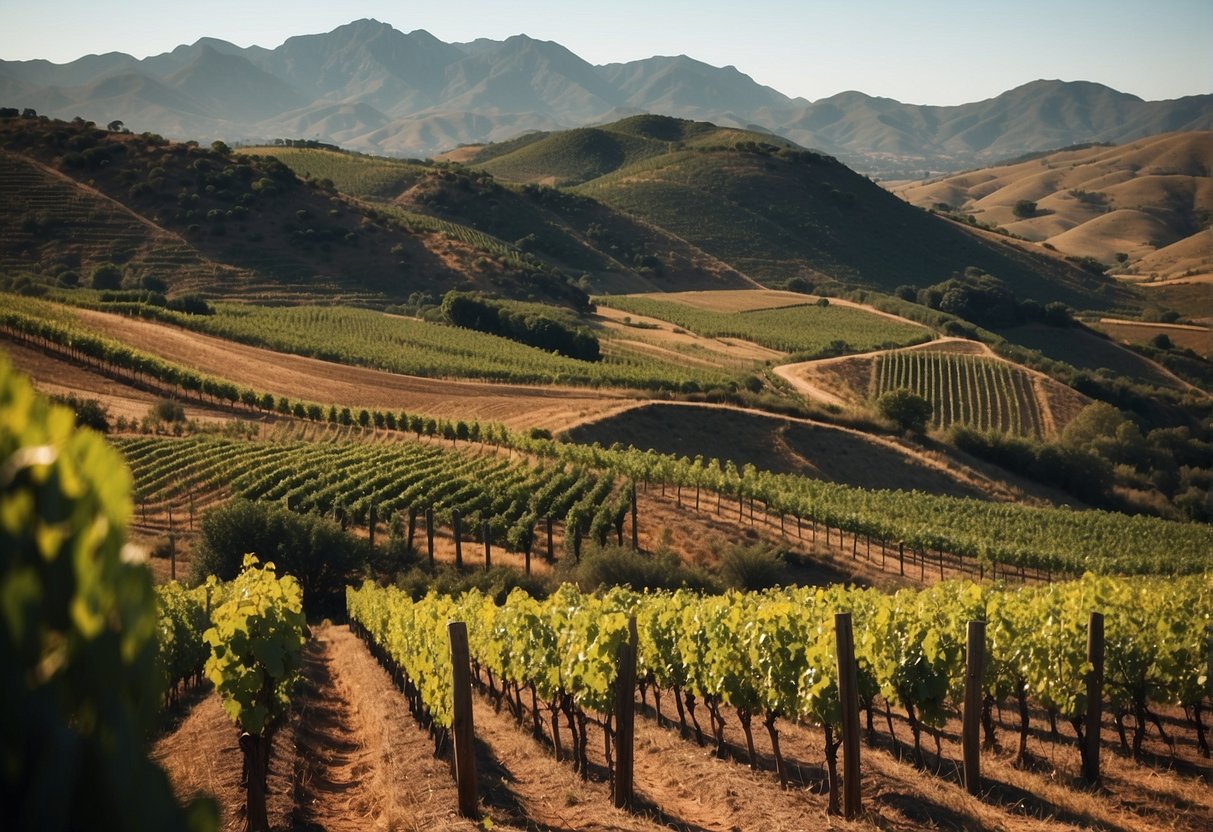
South Africa is renowned for its diverse range of wine grapes, with each variety offering a distinctive taste profile that reflects the region’s unique terroir.
Whether you adore robust reds or prefer the elegance of whites, there’s a South African grape variety to match your palette.
Red Wine Grapes
- Cabernet Sauvignon: Known for its depth and complexity, your bottle of Cabernet Sauvignon likely offers rich flavors and a firm tannic backdrop.
- Shiraz/Syrah: Embrace the bold, spicy notes of Shiraz, a grape that adapts well to South Africa’s climate, yielding full-bodied wines.
- Merlot: Soft and supple, Merlot wines are a friendly choice with their approachable fruitiness and smooth finish.
- Pinotage: South Africa’s signature grape, a cross between Pinot Noir and Cinsaut, produces distinctive wines that can range from fruity to smoky.
- Cinsaut/Cinsault: Often blended, this grape adds softness and aroma, bringing a lighter touch to the wine it graces.
- Petit Verdot: Used in blends, Petit Verdot contributes color, tannin, and a hint of floral notes to the wines.
White Wine Grapes
- Chenin Blanc: Versatile and aromatic, Chenin Blanc expresses the terroir vividly, from crisp, fresh flavors to complex, oak-aged varieties.
- Sauvignon Blanc: Crisp and refreshing, your glass of Sauvignon Blanc might hint at the herbal or tropical depending on where it’s from.
- Chardonnay: Chardonnay varies from creamy and wooded to the more citrus and unoaked styles, showing off the winemaker’s craft.
- Viognier: This grape creates perfumed wines with floral notes and a lush mouthfeel that you’ll find irresistible.
- Riesling: Although not as common, the Riesling of South Africa tends to offer a balance of sweetness and acidity with a zesty lime character.
- Colombard: This grape often goes into brandy production but also makes refreshing, easy-drinking white wines that you’ll find delightful.
- Semillon: Once widespread, Semillon is less common now but is known for adding body and age-worthiness to blends like those found in the historic Vin de Constance.
Winemaking in South Africa
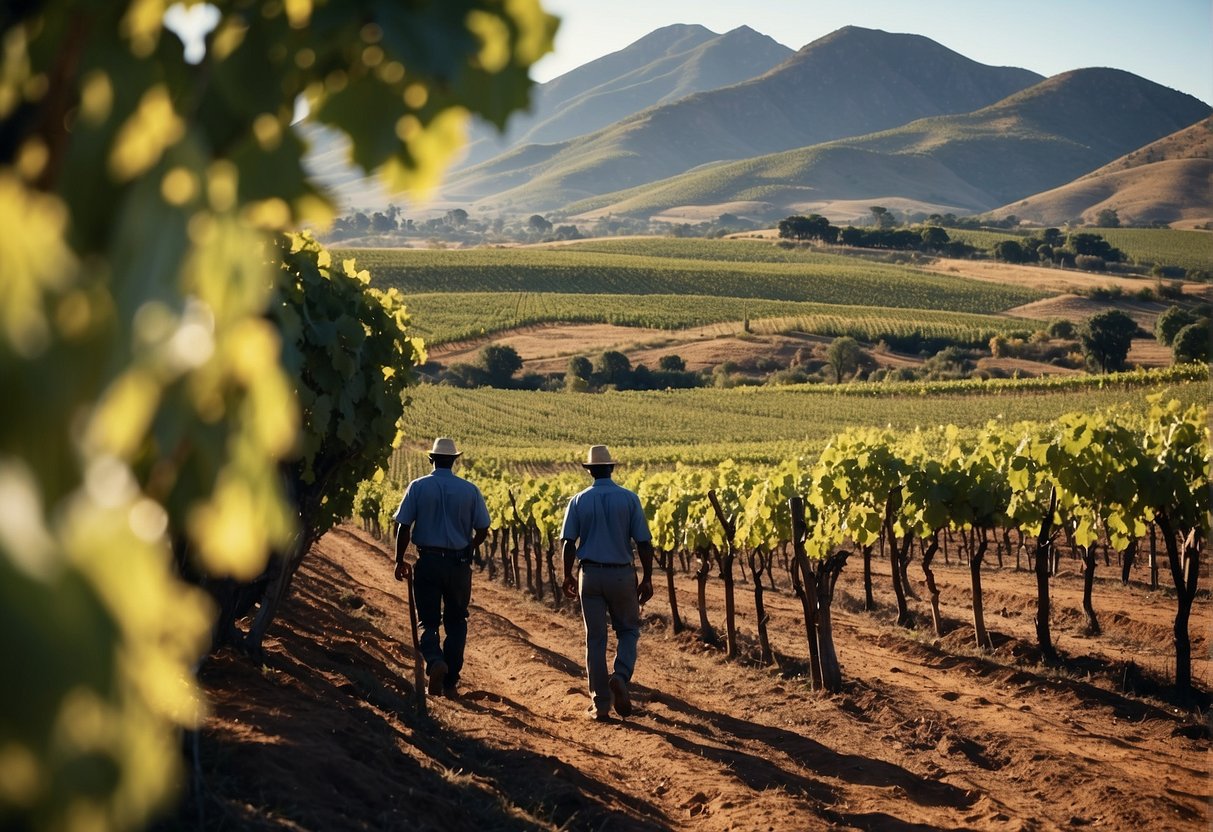
Exploring winemaking in South Africa, you’ll discover a fascinating blend of traditions deeply rooted in the country’s history, with innovation and modern techniques providing a new twist on classic styles.
Traditional Versus Modern Techniques
Old World traditions have a solid footing in South Africa’s winemaking practices.
Techniques passed down through generations are still in use today, particularly in regions that have long been associated with wine production, like Stellenbosch and Paarl.
Workmanship in these areas often reflects a commitment to methods that have stood the test of time, creating wines with a sense of place.
However, as you venture through modern wineries, you’ll notice innovation: stainless steel tanks, temperature-controlled fermentation, and precise aging processes coexist with traditional barrel aging to enhance the quality and flavor profile of Cape wines.
Influence of European Styles
European influence, especially from Bordeaux, is unmistakable in South African winemaking.
You’ll find that the use of French oak barrels and the careful selection of grape varieties mirror the European palate.
South Africa has become renowned for its blends that are reminiscent of the Bordeaux style, blending varieties like Cabernet Sauvignon and Merlot to create complex and elegant red wines.
This influence extends to the white wines as well, with Chardonnay and Sauvignon Blanc grown in cooler regions emulating the crispness and finesse of their European counterparts.
Unique South African Practices
At the heart of South Africa’s unique winemaking identity is the indigenous Pinotage grape, offering a distinctive flavor profile that sets South African wines apart on the international stage.
Methods such as producing sparkling wines through the Méthode Cap Classique—the traditional Champagne method adapted to South African conditions—are a testament to the country’s innovation.
Moreover, the production of sweet wines and fortified wines reflects both the climate’s versatility and the winemakers’ skill in crafting diverse and high-quality wines.
South Africa’s winemaking scene is as diverse as it is dynamic, ensuring every bottle you open delivers a unique story of its origin.
Wine Styles and Classifications
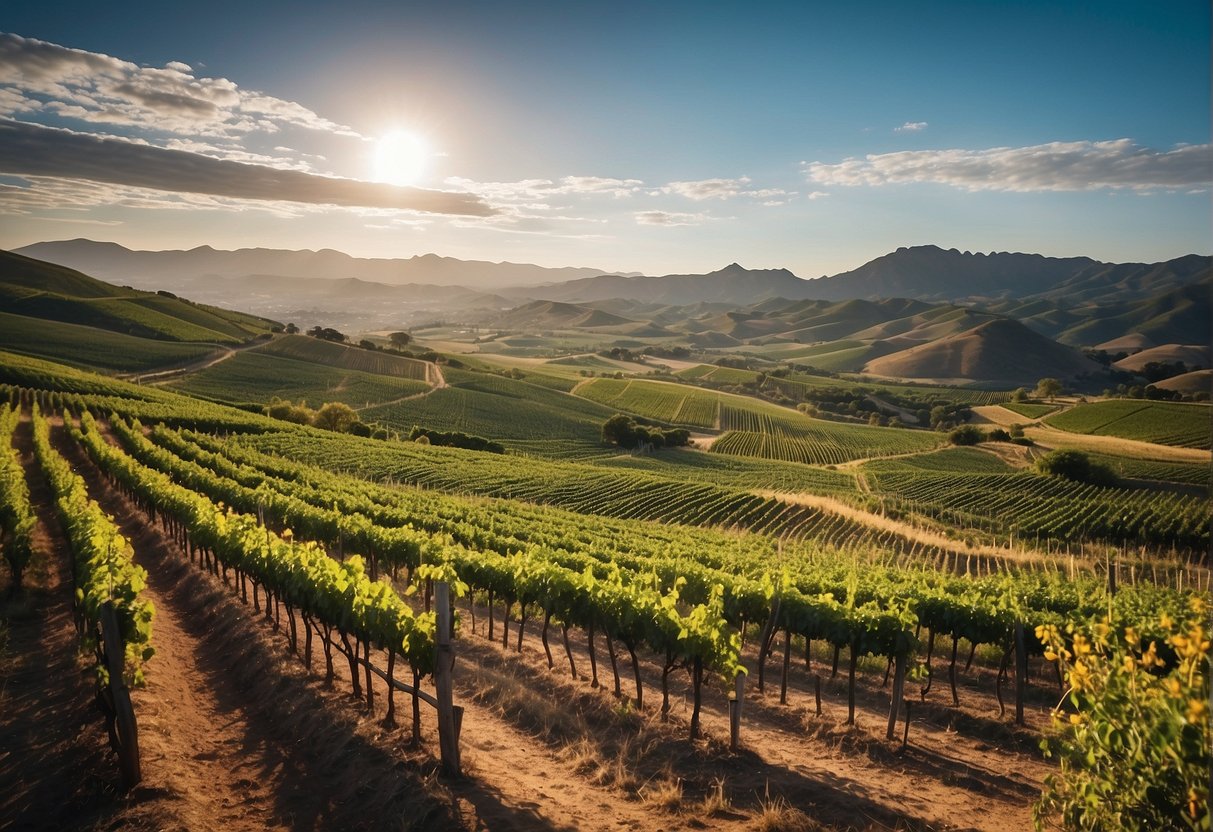
South Africa offers a diverse array of wine styles and each carries its own classification. Understanding these can enhance your appreciation and selection of South African wines.
Red Wines
Your exploration of South African red wines should include renowned varieties like Syrah and Pinotage. The latter is a signature of the region.
The Wine of Origin system ensures that wines reflect the geography of their origins.
A bold Stellenbosch Cabernet Sauvignon demonstrates the power and richness that South African reds can deliver.
White Wines
The white wines of South Africa range from the crisp, fresh Sauvignon Blancs to the complex and nuanced Chardonnays.
Chenin Blanc, often referred to as Steen, is a versatile grape that adapts to various winemaking styles, from dry to sweet, and even sparkling.
South Africa’s cool-climate regions, like the Elgin Valley, are recognized for producing top SA Chardonnay. These are marked by their bright acidity and sophisticated flavor profiles.
Dessert and Fortified Wines
Your sweet tooth will be satisfied by South Africa’s dessert and fortified wines, with Vin de Constance being a historical and luxurious sweet wine option. It hails from the Constantia Valley and is renowned for its rich, honeyed character.
Boberg designates quality fortified wines, often hailing from the regions of Paarl, Franschhoek, and Tulbagh.
Wine of Origin and Labeling
The Wine of Origin (WO) program certifies that the wine you’re enjoying comes from a specific geographic area.
Each label details the district or ward, offering insight into the terroir that shapes your bottle’s profile.
For example, wines from the Coastal Region, encompassing eight districts, are known for their expressive fruit and balance. These are reflective of the coastal influence on the vineyards.
South African Wine Culture
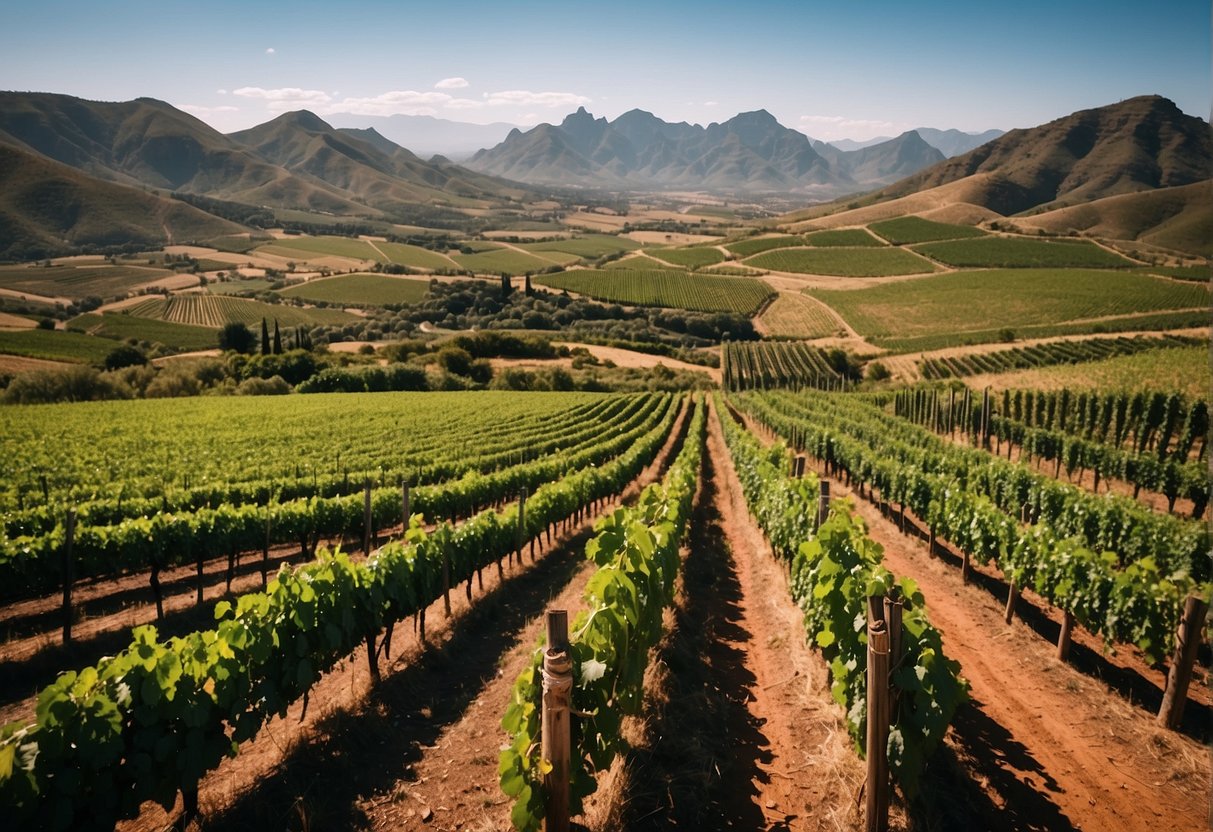
In South Africa, your love for wine finds a vibrant and bustling home. Each region’s unique offerings, from wine and food pairings to stunning vineyard tours, embody the nation’s rich wine heritage.
Wine Tourism
When you explore South African wine tourism, you immerse yourself in an experience that’s more than just sampling exquisite wines. It’s about the picturesque landscapes and the journey through historic vineyards.
You’ll have countless opportunities to visit renowned wine regions such as Stellenbosch, Paarl, and the cooler-climate Walker Bay, each boasting their own distinctive flavors.
From the rolling hills of the Cape Winelands to the rugged terrain of Swartland, the breadth of scenic beauty complements the world-class wines you’ll taste.
Wineries and Tastings
The wineries in South Africa are as diverse as the wines they produce, offering an array of experiences for every palate.
Discover the bold flavors of Pinotage-Syrah blend from the Coastal Region or delve into the complexity of a Sauvignon Blanc with a wine tasting session that enlightens your senses.
Engaging with local winemakers at charming boutique wineries not only broadens your understanding of winemaking but also forges a personal connection with the South African wine tradition.
Each glass tells a story of the land, whether it’s a robust red or a refreshing white, and your journey through the world of South African wines at these tastings will be unforgettable.
The Future of Viticulture
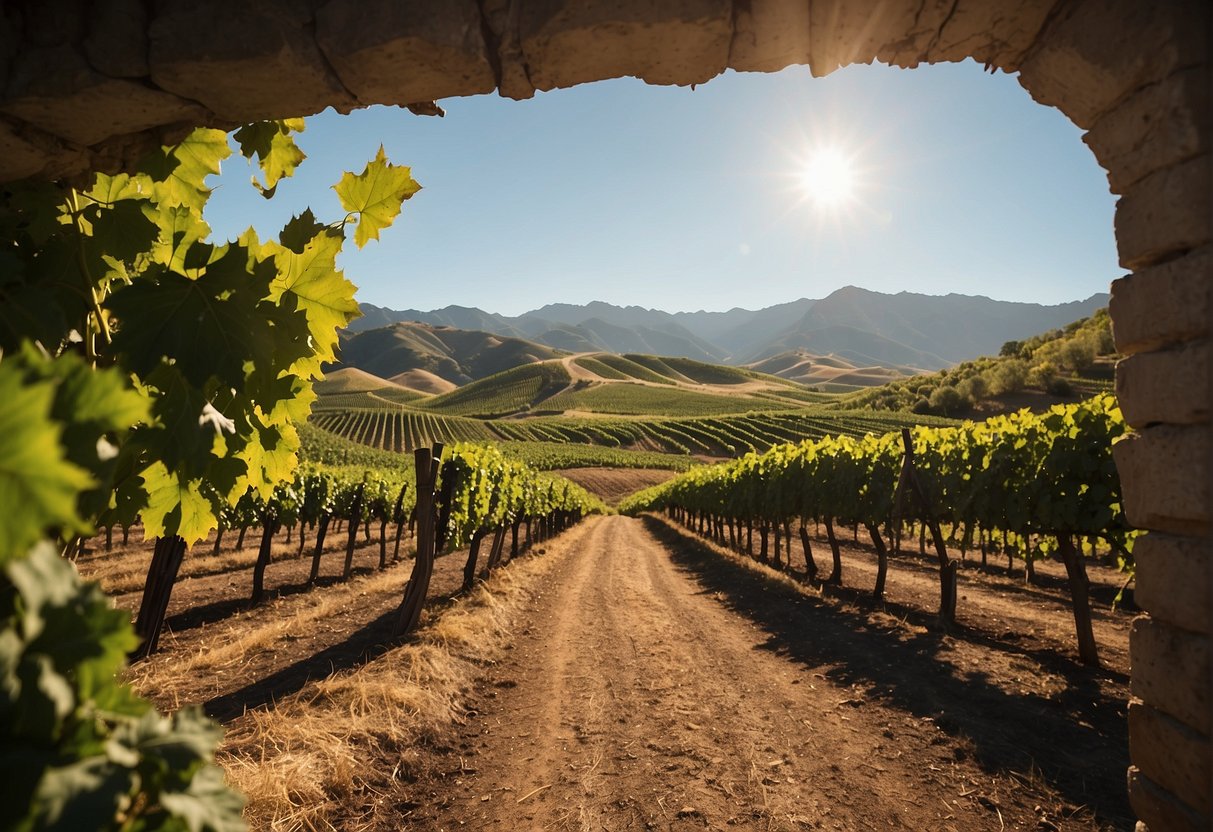
In South Africa, you are witnessing a remarkable evolution in the wine industry, strongly characterized by a commitment to sustainability and biodiversity.
Sustainability and Biodiversity
Your understanding of viticulture’s impact on the environment has deepened, encouraging eco-friendly practices.
You see a trend towards the cultivation of grapes that contribute to sustainable wine production, maintaining the delicate balance of local ecosystems.
You’re also part of embracing diversity in plant life that supports healthy vineyards, which in turn foster a thriving environment.
Adapting to Global Challenges
As you face global challenges like climate change and economic fluctuations, the wine industry in South Africa is being molded by these forces.
Through technological advancements and innovative farming techniques, you’re adapting to these changes. This approach not only secures the longevity of South Africa’s wine industry but also ensures that the quality of your wines continues to meet the high standards expected by connoisseurs around the world.
Frequently Asked Questions
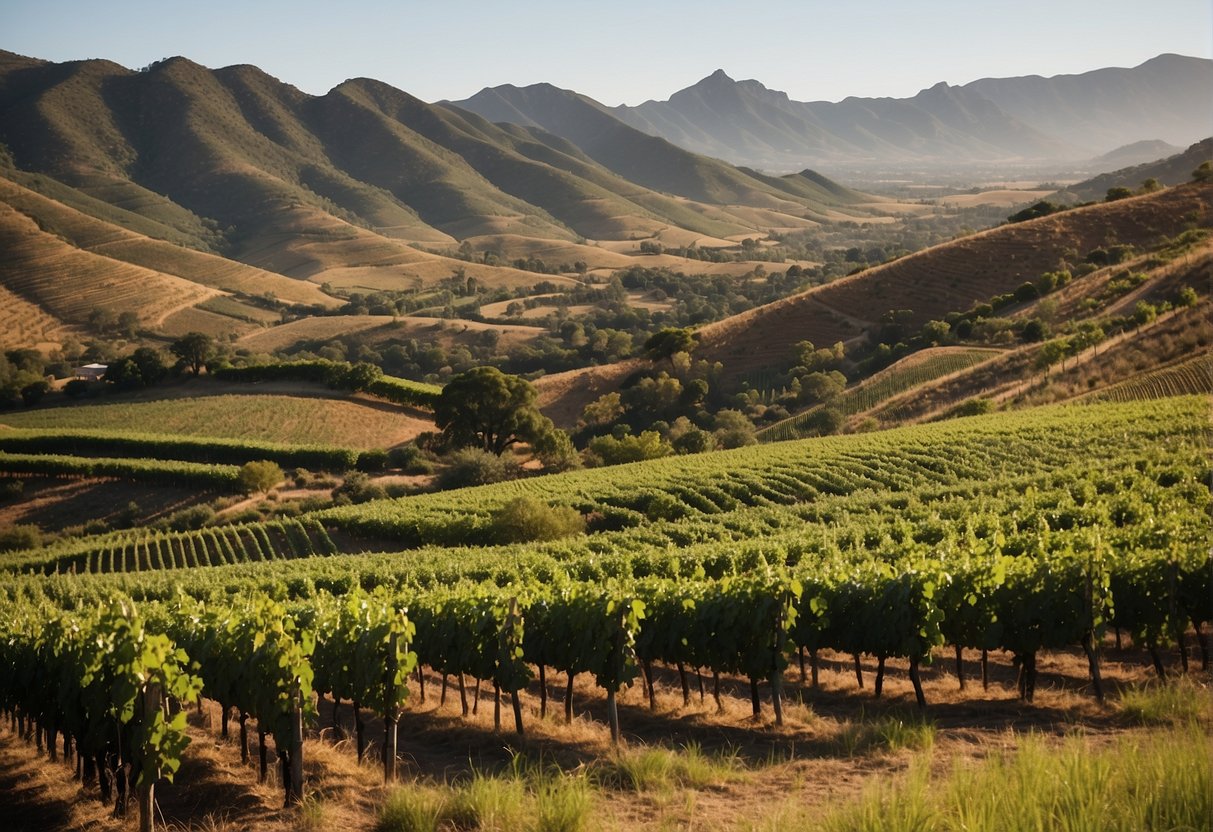
If you’re looking to explore South Africa’s renowned wine regions, you’ve got some excellent questions. Let’s dive into specifics about the Western Cape’s top wineries, tours, and the unique qualities of its wines.
What are the top wine producers in the Western Cape region?
In the Western Cape, you’ll find prestigious producers like Ormonde Wine Estate, which is known for its high-quality selections. The region is replete with top-tier wineries that offer a range of palate-pleasing vintages.
Can you recommend a wine tour in the Stellenbosch area?
For a memorable wine tour in Stellenbosch, head to the Winetourism.com website. They offer curated experiences enabling you to taste some of the region’s best offerings.
Which wineries in Swartland should I visit for a unique experience?
Swartland is home to innovative wineries that push the envelope. Look for those that focus on sustainable practices and unique blends for a truly distinct tasting experience.
What are the characteristics of wines from the Coastal Region in South Africa?
The Coastal Region is famed for its bold red wines. The hot climate here is perfect for cultivating robust varieties like Cabernet Sauvignon, Pinotage, and Syrah.
Where can I find a comprehensive map of wine regions in the Western Cape?
A comprehensive map that details the wine regions in the Western Cape is available from resources like Wine Folly, which offers extensive information on the area’s wine geography.
What makes the wine region near Cape Town unique compared to others in South Africa?
The wine region near Cape Town stands out for its diversity of micro-climates and soil types.
These result in a wide array of wine styles and flavors that are both complex and exquisite.
